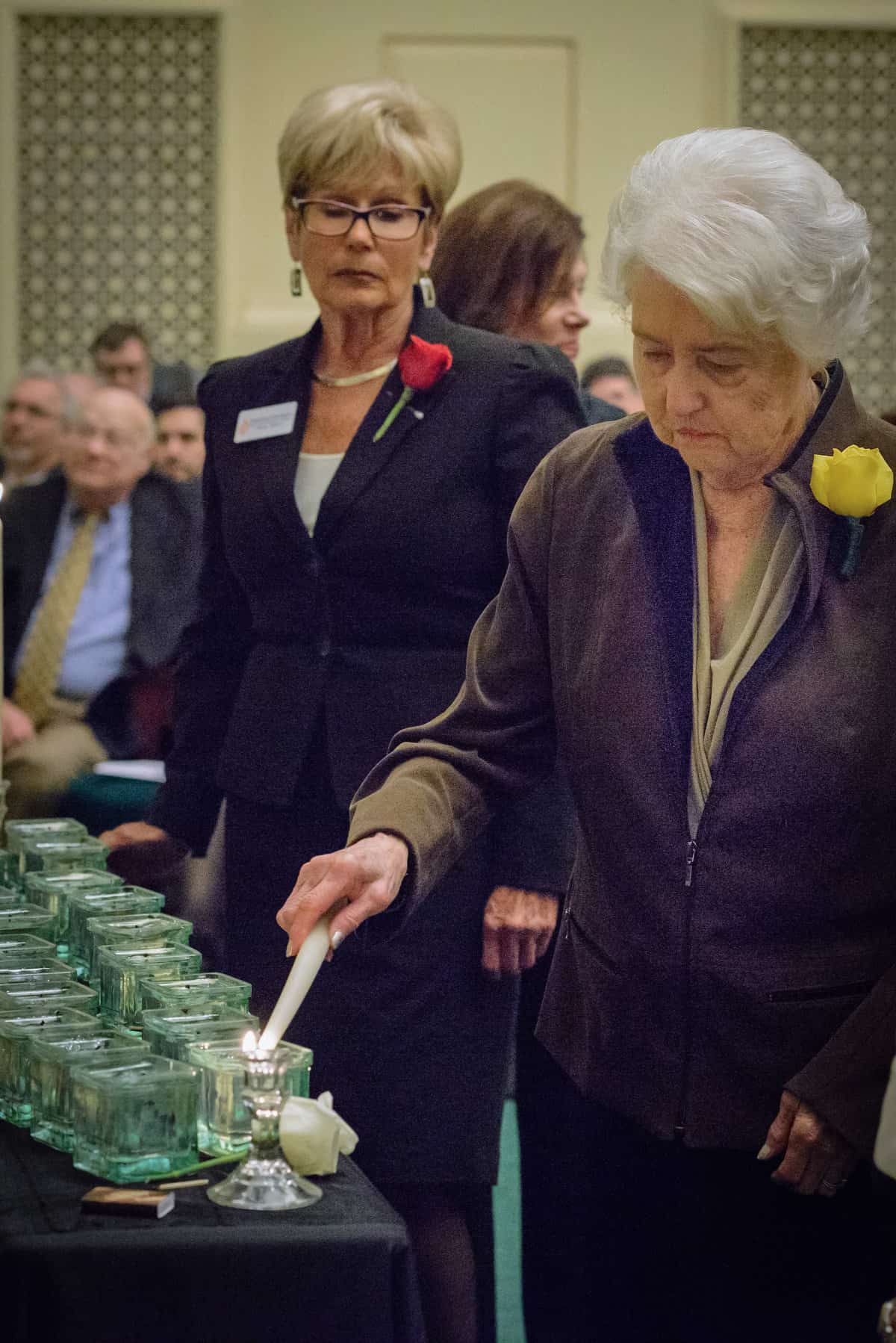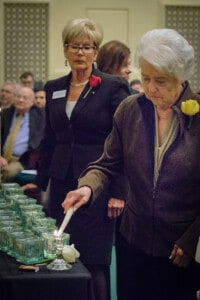Just when you think it can’t get more meaningful, it does. This year’s Yom Hashoah program, sponsored by the Holocaust Commission of the United Jewish Federation of Tidewater at Ohef Sholom Temple on Sunday, April 27, was another poignant and powerful tribute to those we lost, those who survived, the righteous gentiles who risked their lives to save Jews, and the liberators who freed the camps.
As in previous years, there were few empty seats.
“This is an event that truly brings the community together,” says Anne Fleder, Holocaust Commission chair.
Fleder welcomed everyone with thanks, but also with a reminder of why the Commission is necessary. She related the story of Sophie Roth-Douquet, the 16-yearold daughter of a Marine living in Germany. In an opinion piece for USA Today, Roth- Douquet told of how her German classmates hardly learned anything of the Holocaust in their school curriculum, and therefore were dismissive about it, even joking about it while on a field trip to the concentration camp, Dachau. Their attitude, Fleder related, “covered up [the] tragedies of the past and chose to ignore the lesson taught by history: that if allowed to go too far, humans can do terrible things.”
If there could be a polar opposite to that stance, it was represented by the winners of the Holocaust Commission’s 2014 Elie Wiesel Writing and Visual Arts Competitions for students. Thirtyone junior high and high school students were honored at Yom Hashoah with cash prizes, a handblown Star of David paperweight made and donated by local artist Matthew Fine, and the recognition they deserved for submitting outstanding work. Princess Anne High School junior Tara Opitz read her winning poem, A Scattering of Petals, inspired by the courageous actions of the White Rose resistance group in Nazi Germany.
A highlight of the evening was the address given by visiting speaker, 87-yearold Werner Reich. The survivor of Gestapo beatings, prisons, and four concentration camps including Auschwitz, Reich let the audience know right away that he could still laugh. You might not expect a Holocaust survivor to open with a joke, but his humor put the audience at ease, and made them more able to connect with him. Reich shared the story of the most important day of his life, when he was one of 89 young boys selected to live, out of a group of 6,000, by the infamous Angel of Death, Dr. Josef Mengele.
Like many survivors, Reich acknowledges the role of luck in his survival, but he also does not want people to feel sorry for him.
“I survived. Feel sorry for those who did not,” is a line he uses in many talks. In fact, while he was in the area he wowed audiences of middle school students at Norfolk Academy and high school honor students at Granby and Norview with a 70-minute presentation, including more than 300 slides that he gives up to 100 times a year in schools.
“You could have heard a pin drop,” says Gary Laws, Middle School director at Norfolk Academy, who was as inspired as the 350 students with whom he heard Reich’s presentation.
Each year, Yom Hashoah closes after a somber candle lighting ceremony, during which local survivors, liberators, and Righteous Gentiles are honored. The number of honorees who light candles grows smaller each year, as that population grows older. As the quiet and respectful audience looked on during the ceremony, Reich’s closing words seemed to echo in the synagogue:
“We are here, tonight, to honor the victims of the Holocaust and as tribute to them we light 21 candles. The light of these candles will illuminate this room, but only this room, and that, but for a very short time.
“But if, instead of mourning or shedding tears, all of us were to make a promise to educate ourselves, and then pass this knowledge to our community, then the light of this knowledge will not only illumine this room but will also, for a long time, brighten the world around us, and with it banish ignorance and prejudice; it will eliminate hate and give our children and grandchildren a safe future. And that, my friends, would be a true tribute to the victims of the Shoah.”
—Elena Barr Baum is director of the Holocaust Commission of the UJFT. For more information about the Holocaust Commission, its educational programs and its resources, visit www.HolocaustCommission.org.
by Elena Barr Baum


